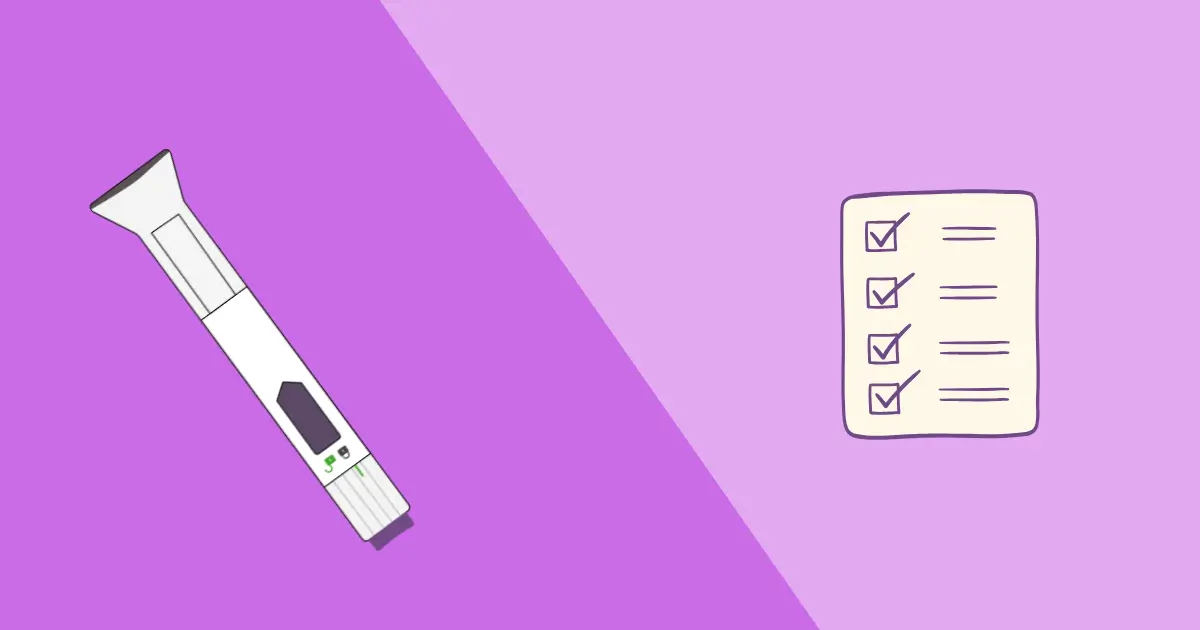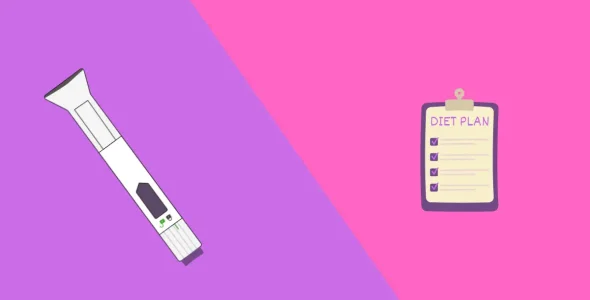How to get Mounjaro without diabetes: Navigating Zepbound and off-label use for weight loss
You've seen the headlines and heard the stories: Mounjaro is a game-changer for weight loss. But there's a catch: It's only FDA-approved for type 2 diabetes. So, where does that leave you?
Key highlights
- Mounjaro is an FDA-approved prescription drug for controlling blood sugar levels in people with type 2 diabetes and is also used off-label for weight loss in people with obesity or overweight, as an adjunct to diet and exercise.
- Getting Mounjaro for weight loss alone is considered “off-label.” This is a common practice for prescribers, but it often results in insurance denials and high out-of-pocket expenses.
- Zepbound is the FDA-approved version of tirzepatide for weight management, making it the simplest legal and insurance-friendly path for patients without type 2 diabetes.
- To access either medication, you must complete a medical evaluation. Clinicians look at BMI, weight-related health conditions, and lab results before prescribing.
- Buying Mounjaro or Zepbound without a prescription is unsafe and illegal. Avoid unlicensed online sources. Any vendor offering Mounjaro or Zepbound without a prescription or without disclosing the pharmacy is unsafe and high-risk for counterfeit products.
- Sustainable success requires medical supervision. Partnering with a clinician ensures proper dosing, side-effect monitoring, and long-term weight management planning.
Obesity can seriously impact health, and for many people, diet and exercise alone are not enough. In these cases, medication can play an important role in helping manage body weight and reduce the risk of long-term health problems. Choosing the right weight loss medication with the fewest side effects can be difficult. While Ozempic is popular, it’s not the only effective option available.
Mounjaro is a prescription injectable medication approved by the FDA in 2022 to help lower blood sugar levels in adults with type 2 diabetes. If you’re wondering how to access Mounjaro without a type 2 diabetes diagnosis, you’re asking the right question. Its results are hard to ignore. Clinical trials show it can lead to around 21% weight loss, more than most other medications available today.
The solution is a common medical practice called off-label prescribing, where a doctor can legally prescribe Mounjaro for weight loss even though it’s labeled for type 2 diabetes, but this often comes with challenges around insurance coverage and cost.
The on-label alternative is Zepbound, which contains the same active ingredient (tirzepatide) and is FDA-approved specifically for chronic weight management, making it easier to access insurance coverage for the medication.
Want Mounjaro for weight loss without a diabetes diagnosis? Our guide explains off-label prescriptions, telehealth options, costs, and a key alternative you need to know about.
Understanding “off-label” prescribing
Off-label prescribing means that a doctor prescribes a medication for a use that isn’t listed on its original FDA approval. This practice is legal and very common in medicine.
A licensed healthcare professional will only prescribe off-label if they believe the medication is medically appropriate and safe for you based on your health history and goals. Off-label use isn’t limited to weight loss. Some medications are also prescribed off-label for conditions like PCOS, migraines, or hormonal imbalances.
As Mounjaro is not FDA-approved for weight loss, it is commonly prescribed off-label for this purpose to patients with obesity or overweight.
The on-label path: Zepbound (tirzepatide)
Zepbound (tirzepatide) is an FDA-approved injectable medication for chronic weight management in adults with obesity or overweight with one or more weight-related health conditions like high blood pressure or diabetes.
Zepbound is the FDA-approved version of Mounjaro specifically for obesity and chronic weight management. Both medications contain the same active ingredient, tirzepatide, but Zepbound is labeled for weight loss, which makes it the appropriate and legally recognized option for people without type 2 diabetes.
To qualify for Zepbound under FDA guidelines, a person must meet one of the following criteria:
- A BMI of 30 or higher, or;
- A BMI of 27 or higher with at least one weight-related health condition, such as high blood pressure, high cholesterol, or obstructive sleep apnea.
These criteria help determine medical necessity and play a major role in whether insurance will cover treatment.
Zepbound is a highly effective dual GLP-1 and GIP receptor agonist that activates both glucagon-like peptide-1 (GLP-1) and glucose-dependent insulinotropic polypeptide (GIP) receptors. This means it targets appetite regulation in the brain while also improving metabolic efficiency, influencing how the body processes insulin, stores fat, and burns energy.
Requesting Zepbound coverage for weight management typically has a much higher chance of insurance approval than trying to obtain Mounjaro for weight loss off-label. In many cases, choosing Zepbound is the more affordable and straightforward path.
Zepbound’s dual FDA approval
Zepbound isn’t only approved for chronic weight management. The U.S. Food and Drug Administration (FDA) recently approved Zepbound for the treatment of moderate to severe obstructive sleep apnea (OSA) in adults with obesity in conjunction with diet and exercise in December 2024.
Zepbound is also the first and only approved prescription medication for adults with moderate-to-severe obstructive sleep apnea in adults with obesity. This FDA approval is based on the results of the SURMOUNT-OSA phase 3 clinical trials.
This makes Zepbound a critical treatment option for a major obesity-related condition, strengthening medical justification and often improving the likelihood of insurance coverage.
The off-label path: Mounjaro without type 2 diabetes
Mounjaro has shown significant weight loss benefits in people with and without type 2 diabetes. In a study published in October 2023, participants achieved an average weight loss of up to 26.6% after 84 weeks of treatment.
Using Mounjaro for weight loss in someone who does not have type 2 diabetes is considered off-label prescribing. This practice is legal and common, but it is done only at the discretion of a licensed healthcare provider who believes the medication is medically appropriate.
The challenge is typically not accessing an off-label prescription. The challenge for most patients is the cost of Mounjaro. Most insurance plans will deny coverage when Mounjaro is prescribed off-label for weight loss, which means the patient is often responsible for the full cash price of about $1,000–$1,200 per month.
Additionally, the manufacturer’s Mounjaro Savings Card requires an FDA-approved type 2 diabetes diagnosis, making it difficult for patients to obtain the medication at a reasonable price.
Despite these financial barriers, clinicians do prescribe Mounjaro off-label when there is a strong medical justification. This may include cases of insulin resistance or prediabetes, metabolic conditions such as PCOS, or when a patient has already tried other FDA-approved weight loss drugs and not sustained results with other FDA-approved weight loss medications like Qsymia or Saxenda.
In these situations, the provider weighs clinical need, metabolic risk, and patient history to determine whether Mounjaro is medically appropriate, even without a diagnosis of diabetes.
How to get a prescription for tirzepatide without diabetes
Here are certain steps that you can follow to get a prescription for tirzepatide even without a diagnosis of type 2 diabetes:
Step 1: Begin with a medical evaluation
The process always starts with medical advice from a licensed, board-certified healthcare provider. This evaluation ensures the medication is medically appropriate and safe for you to use.
Option 1: See your primary care doctor or specialist (in person)
During the appointment, your clinician will review your weight history, medical conditions, current medications, and possibly any recent lab results. If they determine that tirzepatide is appropriate for weight management, they may choose to prescribe it off-label.
This route works well because you receive continuous care, personalized monitoring, and the ability to complete baseline labs or adjust medication dosing as needed.
Bring documentation such as your previous weight-loss attempts, any prior medications you’ve used, and a list of other health conditions like high blood pressure or sleep apnea. This helps your clinician build a strong, medically justified case for weight loss treatment.
Option 2: Telehealth visits with licensed clinicians and clinics
Many reputable telehealth platforms now offer virtual consultations for GLP-1 and incretin-based therapies, including tirzepatide. During these visits, a licensed clinician reviews your medical history, BMI, and any relevant health conditions.
Some of these services are structured as specialized weight-management clinics or membership-based programs that include ongoing support and access to providers.
The main advantage of this route is convenience and faster access, with continued follow-up and dose monitoring available remotely. However, it’s important to choose a legitimate service that provides a real clinical evaluation, documents your care, and dispenses medication only through licensed U.S. pharmacies.
Avoid platforms that promise quick approvals without assessment or that ship medication from unverified sources.
Option 3: Weight-management clinics and membership programs
Some medical weight-loss clinics and membership-based programs offer comprehensive care that includes clinician evaluations, nutrition coaching, lifestyle support, and medication management.
These clinics typically follow standard BMI eligibility guidelines for weight-management prescriptions and provide structured monitoring throughout treatment. This can be helpful for patients who want more guidance and accountability.
The advantage of this approach is integrated, ongoing support, but the downside is that program fees can vary widely, and insurance coverage may not always apply.
Option 4: Clinical trials and research studies
If you don’t qualify for standard prescribing routes, consider enrolling in clinical trials that are testing tirzepatide or related agents. Trials provide close medical monitoring, regular follow-up, and the chance to receive the investigational drug under strict oversight. Search ClinicalTrials.gov to find active studies in your area.
Never use forged prescriptions or buy medication from unlicensed online sellers. It’s illegal and dangerous. Counterfeit products have been found to contain harmful or toxic substances. Always obtain drugs through licensed U.S. pharmacies and legitimate clinical channels.
Step 2: Get lab work if required
Before prescribing tirzepatide, your clinician may ask for certain lab tests to ensure the medication is safe and appropriate for your body. These often include A1C and fasting glucose levels to understand how your body currently handles sugar, along with kidney and liver function panels, since these organs play key roles in processing medications.
Even if you do not have type 2 diabetes, this information helps establish your metabolic baseline, which is important for monitoring progress and minimizing risks once treatment begins.
These lab tests may also strengthen the medical justification for prescribing tirzepatide, especially if insurance approval is being pursued. For example, lab results showing insulin resistance, prediabetes, elevated inflammatory markers, or other metabolic concerns can support the case for treatment. Ongoing labwork may also help your clinician tailor dosing, track improvements, and ensure that you are responding well over time.
Step 3: Your provider determines the prescription (on-label vs. off-label)
Once your evaluation and labs are completed, your clinician will choose the medication that best fits your health profile and goals. For most people seeking weight management, the ideal prescription is for Zepbound.
Even though Zepbound and Mounjaro contain the same active ingredient (tirzepatide), they are approved for different medical purposes:
- Mounjaro is FDA-approved for type 2 diabetes.
- Zepbound is FDA-approved for chronic weight management in adults with obesity or overweight.
This difference matters because it determines whether the prescription is considered on-label (standard medical use) or off-label (clinician-decided alternative use), which may influence:
- Insurance access: Since Zepbound is specifically approved for weight loss, it has a clear diagnosis pathway for obesity or overweight with related conditions. This makes it easier for insurance to consider covering it, compared to Mounjaro when no diabetes diagnosis is present.
- Savings programs: The Zepbound Savings Card is designed for people using tirzepatide for weight loss, meaning no diabetes diagnosis is required to qualify. By contrast, the Mounjaro savings card requires a type 2 diabetes diagnosis and prescription.
If your treatment goal is weight loss, Zepbound is usually the more accessible and financially practical brand of tirzepatide, while still providing the same clinical benefits seen with Mounjaro.
Step 4: Navigate cost and fulfillment
After your prescription is written, there is still an important administrative phase before treatment begins. Your clinician’s office will typically submit a Prior Authorization (PA) to your insurance company, which is a formal request that explains why tirzepatide is medically appropriate for you.
This step can take anywhere from a few days to several weeks, and you may need to provide documentation such as weight history or records of previous weight-loss attempts.
Once approved, your prescription should be filled through a licensed U.S. pharmacy, either local or mail-order. Avoid any “no-prescription-needed” online sellers, as counterfeit incretin medications have been widely reported.
If your insurance plan allows, apply the savings card at the pharmacy to lower your copay. If insurance denies coverage, your clinician may need to submit an appeal, or you may explore options such as switching to another pharmacy, adjusting formulary preference, or considering alternative affordability support programs.
Red flags for online sourcing
Be extremely cautious when purchasing Mounjaro or Zepbound online. Avoid any platform that:
- Does not require a valid prescription or a clinician’s evaluation.
- Does not clearly disclose the licensed U.S. pharmacy that is filling the medication.
- Does not request recent medical history to confirm safety.
Websites that bypass these safeguards are often linked to counterfeit or contaminated products, and using them can be dangerous. Always ensure your medication is prescribed by a board-certified prescriber and comes from a licensed pharmacy.
What clinicians commonly look for before prescribing for weight loss
Clinicians usually start by looking at the following factors:
- BMI criteria: Similar to those used for most FDA-approved weight-loss medications, a BMI of 30 or higher, or 27 or higher with a weight-related health condition like high blood pressure, high cholesterol, sleep apnea, or prediabetes. Establishing that the patient meets the BMI requirement helps justify the need for treatment.
- Comorbidities and risks involved: They will also review your medical history, including any conditions (diabetes, hypertension, sleep apnea, dyslipidemia, cardiovascular disease) linked to metabolic health, because having obesity-related comorbidities strengthens the clinical rationale for prescribing.
- Prior treatment history: Your provider will ask what you’ve already tried, nutrition changes, exercise approaches, any past weight-loss medications, and response or tolerability to GLP-1 drugs to determine what has been effective or poorly tolerated.
- Baseline labs: Some clinicians will order baseline lab tests such as A1C, fasting glucose, kidney and liver function, and pregnancy testing when applicable.
Mounjaro can cause potential side effects similar to other GLP-1 medications, most commonly nausea, vomiting, diarrhea, decreased appetite, and constipation, especially when starting or increasing the dose. Less common but serious risks include pancreatitis, gallbladder issues, and low blood sugar (hypoglycemia).
Mounjaro has a black box warning from the FDA for the risk of thyroid tumors or thyroid cancer, including medullary thyroid carcinoma (MTC).
Paying for Mounjaro without insurance
Mounjaro can be expensive. The list price of Mounjaro is $1,069.08 per fill, according to the manufacturer, Eli Lilly. Each fill includes 4 prefilled pens, which is a 28-day supply. Without insurance, the retail price is estimated to be around $1,000-$1,200 per month.
Insurance coverage for Mounjaro varies widely because it is FDA-approved for type 2 diabetes, not weight loss. When it’s prescribed off-label for weight management, insurance companies often deny coverage. However, some patients do get coverage after prior authorization or an appeal, especially if they have related health conditions like prediabetes, PCOS, high blood pressure, or sleep apnea.
It’s important to check your insurance plan’s policies and ask your clinician to submit medical-necessity documentation.
The manufacturer, Eli Lilly, offers a Mounjaro savings card to help lower the out-of-pocket cost for eligible individuals with commercial insurance. These savings programs can reduce the cost significantly for those who qualify. The Mounjaro savings card only works for people with type 2 diabetes and commercial insurance. It cannot be used for weight loss prescriptions.
Employer-sponsored insurance may cover Mounjaro for type 2 diabetes, but most plans, including Medicare and Medicaid plans, won’t cover Mounjaro or Zepbound for weight loss or obesity due to the Medicare Prescription Drug, Improvement, and Modernization Act law that prohibits it. Contact your insurance provider for coverage details.
Lilly Cares Foundation is a non-profit charitable organization that provides Lilly medications free of charge for up to 12 months. Eligible patients can receive free medication by meeting the program’s income and insurance requirements. Applicants must submit documentation of their financial situation and insurance status, which is reviewed by Lilly USA to determine eligibility. While the program provides access to other Lilly medications, currently, Eli Lilly’s Lilly Cares Foundation does not cover Mounjaro. However, this could potentially change in the future.
It’s strongly recommended to shop around at different pharmacies to find the best price or use online tools like GoodRx or SingleCare to compare costs.
Alternatives to Mounjaro for weight management
Several FDA-approved weight-loss medications may be easier to access insurance coverage when used for their intended purpose.
Zepbound (the tirzepatide brand labeled specifically for weight management) and Wegovy (semaglutide for chronic weight management) are both GLP-1 treatments with official FDA approval for obesity treatment, which can simplify insurance approval compared to off-label Mounjaro use. You can also consider speaking with your doctor about Victoza and Saxenda (both contain liraglutide) as an alternative to Mounjaro.
There is currently no generic Mounjaro available in the United States.
Non-medication options also play an important role in care. These include structured medical weight-loss programs, dietitian-guided nutrition therapy, lifestyle changes, behavioral counseling, and, for eligible patients, bariatric surgery or approved medical devices.
A clinician can help determine which approach aligns best with your medical needs, goals, and insurance situation.
FAQ’s
Can I get Mounjaro if I don’t have diabetes?
Yes. Mounjaro can be prescribed off-label for weight management even if you don’t have diabetes. A clinician will review your BMI, health history, and any weight-related conditions before prescribing it. Make sure to use legitimate medical channels such as your primary care provider, a certified telehealth service, or a licensed weight management clinic.
Is it legal to buy Mounjaro online without a prescription?
No. Buying Mounjaro online without a prescription is illegal and unsafe, and products sold by unlicensed sellers are frequently counterfeit or contaminated. Always obtain Mounjaro through a licensed U.S. pharmacy with a valid prescription from a licensed healthcare provider.
Will my insurance cover Mounjaro for weight loss?
Insurance typically does not cover Mounjaro for weight loss unless there is a documented medical need or specific plan authorization. Most insurers will only cover the weight-loss version of the medication, Zepbound, since it is FDA-approved for obesity treatment.
Are telehealth prescriptions safe and legitimate?
Yes, telehealth prescriptions are safe and legitimate when they using licensed clinicians who conduct a proper medical evaluation and provide follow-up care. Look for reputable platforms that verify medical history and do not offer instant approvals without a real consultation. Avoid any service that promises medication with “no prescription needed.”
What’s the difference between Mounjaro and Zepbound?
Mounjaro and Zepbound contain the same active ingredient (tirzepatide) and are made by the same company, but they are FDA-approved for different conditions. Mounjaro is approved for type 2 diabetes, while Zepbound is approved specifically for chronic weight management. The difference is primarily in their labeled use and how insurance plans choose to cover them.
Can I use the Mounjaro savings card for weight loss?
No. The Mounjaro savings card can only be used if the prescription is for type 2 diabetes, and pharmacies are required to verify this diagnosis through insurance. If the medication is being used for weight loss, the savings card will not apply, and the discount will be denied at the pharmacy.
Is getting Mounjaro for weight loss safe?
Yes, Mounjaro has a similar safety profile whether it’s used for diabetes or weight management. However, it’s important to be evaluated by a clinician to rule out contraindications, such as a personal or family history of medullary thyroid carcinoma or certain endocrine disorders. Proper medical supervision ensures dosing, monitoring, and side effects are managed safely.
What are the best telehealth services for getting a prescription?
Telehealth prescriptions can be safe and legitimate when offered by licensed clinicians via reputable platforms. For example, Teladoc allows virtual visits with board-certified doctors for a wide range of conditions. MDLIVE offers 24/7 access to licensed providers for urgent, primary, and behavioral health care. Doctor on Demand also supports virtual appointments and prescription services with insurance acceptance.
Conclusion: Starting your tirzepatide weight loss journey without diabetes
Getting Mounjaro without a type 2 diabetes diagnosis is possible, but it’s often an uphill battle, primarily due to insurance denials and the high out-of-pocket cost.
The most strategic and patient-friendly path to access tirzepatide for weight loss goals is to pursue a prescription for Zepbound, which contains the same active ingredient (tirzepatide) but is FDA-approved specifically for chronic weight management. This gives you a far higher chance of insurance coverage and access to manufacturer savings programs.
You can obtain Mounjaro off-label for weight management through legitimate clinical pathways, whether in person or via reputable telehealth services. Expect a full medical evaluation, documentation of your weight-related health risks, and possible lab testing.
Schedule a medical consultation, either with your primary care provider or a trusted telehealth weight-management clinic. They will help determine your BMI eligibility, order any necessary labs (if required), and guide you toward the safest, most affordable path to accessing tirzepatide for your weight loss journey.






